Politics
Many African kings opposed eradicating slavery
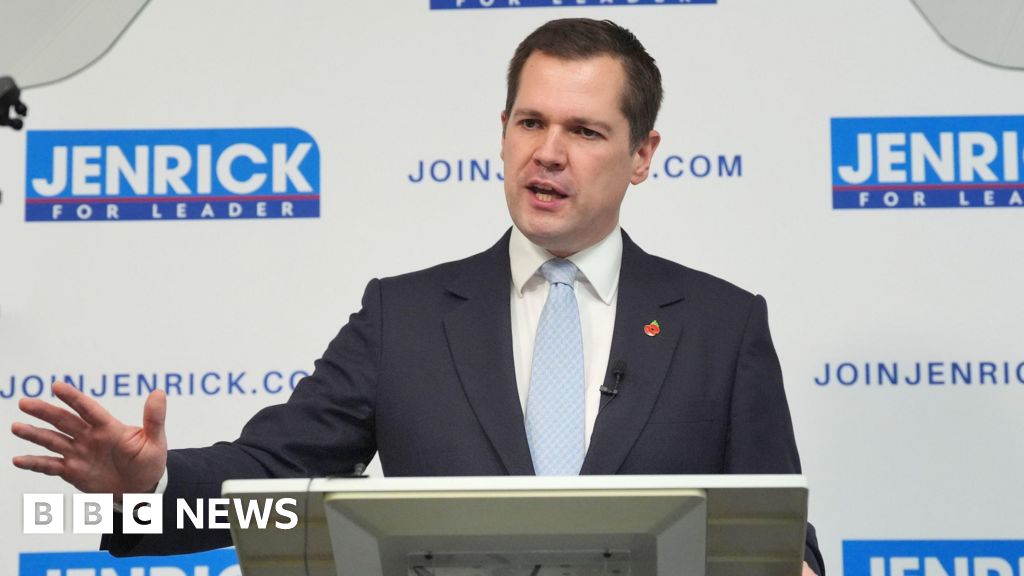
The government should “unequivocally reject” calls for the UK to pay reparations for its role in the slave trade, Tory leadership candidate Robert Jenrick has said.
He said calls for the UK to pay reparations were “based on false and misleading narratives about our past”.
Britain “worked harder than nearly any other country to eradicate the practice” in the 19th century, adding that the campaign against slavery was “opposed by many African kings”.
There have been attempts to get reparations discussed at a meeting of the 56 Commonwealth countries in Samoa.
Chancellor Rachel Reeves has already ruled out making payments, telling the BBC: “That’s not something that this government is doing.”
Prime Minister Sir Keir Starmer said the slave trade was “abhorrent” but that it would be better to focus on “today’s challenges” such as climate change.
Caribbean countries have been particularly keen to press the issue. Earlier this week, Bahamas foreign minister Frederick Mitchell told BBC Radio 4’s Today programme that reparations were not just about money but a matter of “respect, acknowledging the past was wrong and needs to be corrected”.
Kemi Badenoch, Jenrick’s opponent in the Tory leadership race, said the government was facing reparation demands because Labour politicians had “spent their time in opposition supporting these sort of fringe, unnecessary causes under the guise of decolonisation”.
“Now the British public are waking up to the reality of a Labour government that is ashamed of its own country – giving away the Chagos Islands, watering down Britain’s influence at the UN, and reducing our support for Israel in their fight against terror.
“If I am leader of the opposition I will ensure Keir Starmer is held to account for his deplorable actions.”
Reparations are actions that can be taken to amend for past wrongs. For example, in 2013, the UK government paid £19.9m to 5,000 elderly Kenyans who had been tortured by British colonial forces in the 1950s.
From the 16th century, the British government, along with other European countries, participated in the transatlantic slave trade.
It is estimated that between 1500 and 1800 around 12 -15 million people were trafficked from African countries to be used as enslaved labour in the Caribbean, North, Central and South America. Around two million died on the journey to the Americas.
Having been one of the big beneficiaries of the trade, Britain had a key role in ending the practice and abolished slavery in 1833.
As part of the policy, British plantation owners were paid £20m for the loss of their slaves, creating a debt the UK only finished paying off in 2015.
Addressing the Henry Jackson Society think tank in London, Jenrick said: “It was Britain that spent 1.8% of GDP between 1808 and 1867 on eradicating slavery – the most expensive moral foreign policy on human history.”
“It was a campaign in fact opposed by many African Kings.
“The West African squadron sacrificed their lives for liberty and freedom and it is high time that we recognise their contribution with a national memorial to honour them and everything that they did.”
The Royal Navy squadron was tasked with stopping vessels transporting slaves and was involved in freeing around 150,000 slaves in the 19th century.
Just as European nations were enriched themselves through the slave trade, some African slave sellers also profited from the practice.
Jenrick said calls for the UK to pay reparations were “based on false and misleading narratives about our past”.
Last year, a UN judge co-authored a report which estimated that the UK should pay £18.8tn for its involvement in slavery.
The report said the harm caused by the slave trade was “vast” adding: “Its repercussions resonate in the lives of descendants of the enslaved to this day.”
It also argues that descendants “even to this day” have lower incomes and poor health outcomes.
Historian Professor Sir Hilary Beckles told the report that slavery had led to the black population in the Caribbean experiencing high levels of diabetes, with Barbados and Jamaica “competing for the title of ‘Amputation Capital of the World.’”.
Politics
Some Home Office staff to get pay rise of over 9%
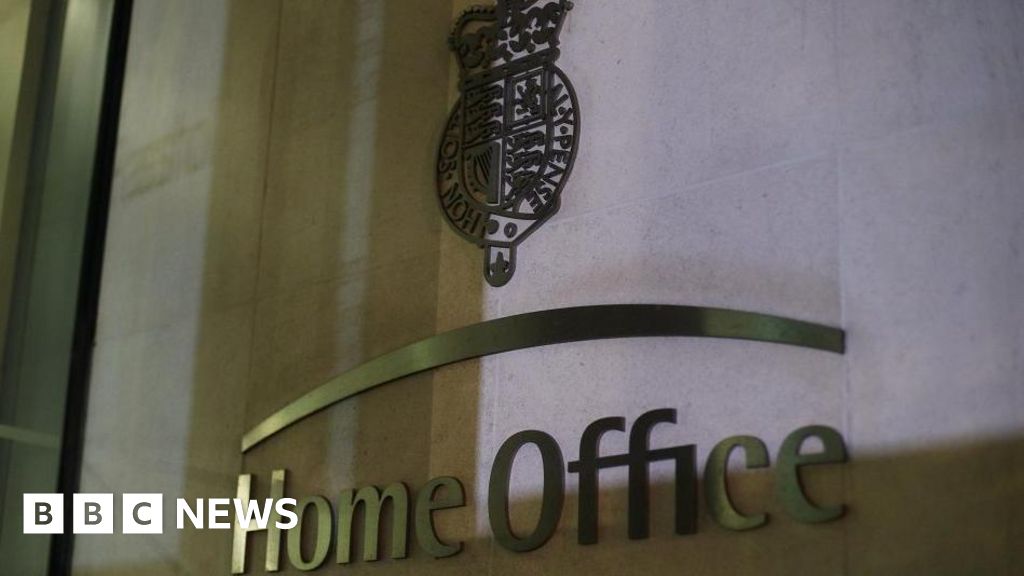
Some Home Office staff are getting an inflation-busting 9% pay rise, the department has confirmed.
The union representing civil servants, PCS, welcomed the deal, which is nearly double the 5% agreed for most civil servants.
The pay boost is meant to improve staff retention and morale, which is the lowest in the civil service.
But Conservative MP Neil O’Brien said the pay hike would “stick in the craw” of people worried about immigration and crime.
The BBC understands the pay rises will be backdated to the start of July and will range from 6% to 9.1% for executive officers working outside of London.
Inflation is running at 2.2%, according to the latest figures.
But the PCS union said its members “deserve rises significantly above inflation to reclaim pay that we have lost through years of below-inflation rises”.
The Home Office’s most recent annual report showed the cost of hiring temporary agency staff had tripled on the last two years to more than half a billion pounds, most of which was spent on dealing with illegal immigration, as well as the now-cancelled Rwanda deal.
A Home Office spokesman said the pay rises were in line with the civil service pay remit guidance.
He said: “This year’s pay guidance recognises the hard work and vital importance of all our staff and is broadly in line with others in the public sector.
“One relatively junior grade in a particular region has received the higher amount to bring them into line with their peers.”
PCS general secretary Fran Heathcote said she would continue to push for a “fair and sustainable long-term pay settlement” to make up for “many years” of below-inflation pay.
She said: “We have made progress in negotiations with the Home Office and we welcome the fact that the final offer would deliver increases for the admin and executive grades that are above the 5% headline figure in the civil service remit.
“We believe this is the best award that can be delivered through departmental negotiations alone.”
However, critics have questioned whether the recent performance of the Home Office staff justified a bumper pay rise.
The move comes as the number of migrants who have crossed the Channel in small boats so far this year topped 29,000, approached the total for the whole of last year.
O’Brien said: “I have no problem with people being rewarded for good performance.
“But with massive numbers crossing the channel, crime clear-up rates low and dangerous people getting let out of jail, this large pay rise will stick in the craw of a lot of people.”
Politics
Couple given go-ahead to sue governments over winter fuel payment
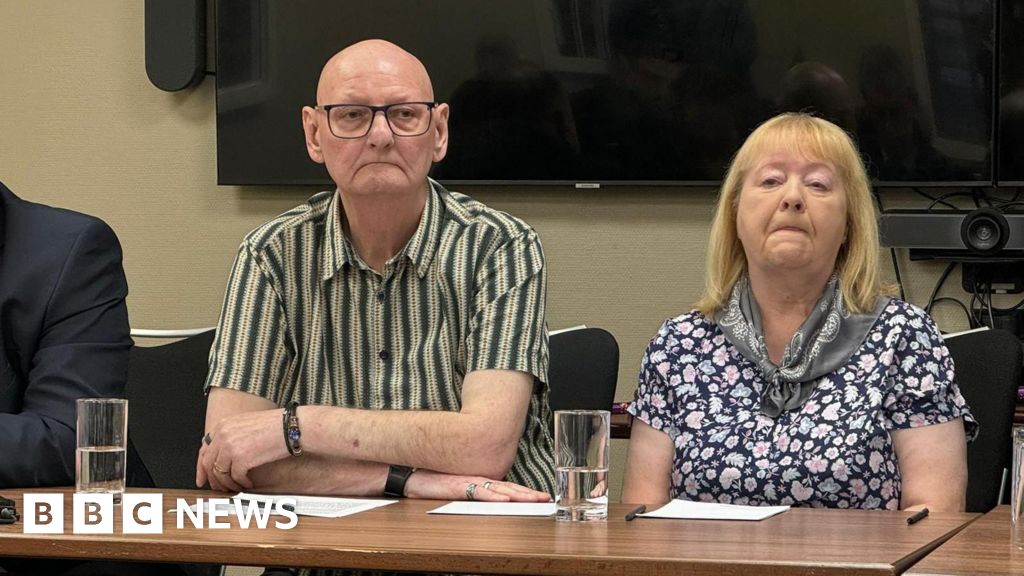
A Scottish couple have been given permission to proceed with a legal bid to overturn the scrapping of the universal winter fuel benefit for all pensioners.
Peter and Florence Fanning, from Coatbridge in North Lanarkshire, have argued both the UK and Scottish governments failed to adequately consult with those of pension age and did not release an equality impact assessment on the changes.
The judicial review required a judge’s approval to move to a full hearing, which has been given.
A hearing at the Court of Session in Edinburgh is now scheduled for 15 January.
The case will ask the Court of Session to rule on whether the decision to scrap the universal benefit was unlawful.
This would allow the petitioners to ask the court to, in effect, set aside the policy and restore the winter fuel payment to all.
A spokesperson for Govan Law Centre, which has taken the case for the Fannings, said their clients were “delighted” that permission had been granted.
They added they were awaiting a decision next week on whether civil legal aid from the Scottish Legal Aid Board would be granted.
The controversial decision has been criticised by trade unions and groups representing older people.
Chancellor Rachel Reeves previously announced the benefit needed to be means- tested from this winter due to a £22m “black hole” in public finances that she said Labour had inherited from the previous Conservative government.
The benefit is devolved but the Scottish government said it had to follow suit as £160m had been taken out its budget.
Mr Fanning stated in September that the decision created “manifest injustice” for those affected.
The couple were being supported by former Scottish first minister Alex Salmond, who put them in touch with Govan Law Centre and called the payment being scrapped “unacceptable”.
The Alba party leader has since died after suffering a heart attack in North Macedonia.
First Minister John Swinney said last month that he understood public concerns about the payment but that the Scottish government was having to face “hard reality” regarding budgets.
Earlier this month the SNP tabled a Holyrood motion calling on Sir Keir Starmer to reverse the decision.
A spokesperson for the UK government previously said it was committed to supporting pensioners and that millions would see their state pension rise by £1,700 during this parliament.
Politics
Chess fanatic playing Labour’s first big gambit

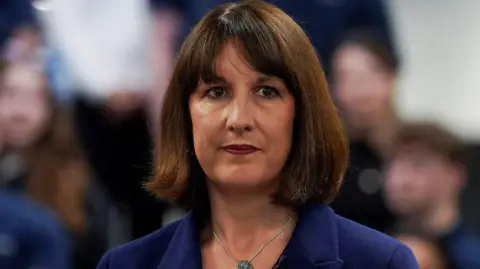 Reuters
Reuters“Serious” and “determined” are words often used to describe Rachel Reeves, the UK’s first female chancellor.
But colleagues and friends have suggested the Labour MP’s public persona does not reflect her human side, with a loud laugh and deep love of Beyoncé tracks.
In her maiden speech in the House of Commons in 2010, she vowed to fight for “jobs, growth and prosperity” – likely centrepieces of Labour’s first Budget in nearly 15 years, on 30 October.
So who is Reeves, and how is she addressing the economic and financial challenges the country faces?
Reeves was born in south-east London in 1979, just months before Margaret Thatcher became prime minister at a time of immense social and economic change.
She has previously told the BBC her mother would tick off items on a bank statement against receipts while sitting at the kitchen table: “We weren’t poor, but we didn’t have money to waste.”
Her parents separated when she was at primary school, and she and younger sister Ellie, also a Labour MP, were shuttled between separate homes.
During the school holidays, the sisters would spend time with their grandparents in the Northamptonshire town of Kettering.
They would be taken to do the rounds of relatives’ houses, who would give them a 20p or 50p piece each. At the end of their week, they were taken to the local toy shop to choose their goodies. While Ellie would spend all her cash, the young Rachel would allow herself a smaller treat and save most of the money.
Decades later, Chancellor Reeves would say that kind of restraint defines her, and she has very much modelled herself on Gordon Brown’s “prudence” in the lead-up to Labour’s 1997 election win.
Chess talent
Reeves played chess from an early age, with her father teaching her the key moves. She became a national under-14 champion, and would “quietly thrash” any boys who might think they were in for an easy game, according to Ellie.
She has credited chess with teaching her “to think ahead, to plan a strategy”.
A keen flute player, she took her music GCSE a year early at Beckenham’s Cator Park School for Girls, a comprehensive, and would go on to gain four A grades at A-level.
Seeing the extent of cuts at her school, where the library had been turned into a classroom and the sixth form consisted of “two pre-fab huts in the playground”, she has said she was politicised by her own experience of public services. At the age of 16, she joined the Labour Party.
She went on to study Philosophy, Politics and Economics at Oxford University. As a student, she would host others before college discos, blasting out Destiny’s Child songs and dressing up in her room.
Rachel Reeves: The basics
Age: 45
Place of birth: Lewisham, south-east London
Education: New College, Oxford and the London School of Economics
Family: Married to Nicholas Joicey, a senior civil servant and former speechwriter to Gordon Brown during his time as chancellor. They have two children. Her sister is Labour Party chair Ellie Reeves.
Parliamentary constituency: Leeds West and Pudsey
 PA
PAAfter graduating, Reeves took on a role as an economist at the Bank of England.
She worked on the central bank’s Japan desk, looking at the country’s attempts to come out of stagnation in the 1990s.
During a secondment to the UK embassy in Washington, she met her future husband Nicholas Joicey, who had spent time as a film critic for newspapers and as a speechwriter to then-Chancellor Gordon Brown.
The path to Parliament was not an easy one though. There were two failed campaigns for the former seat of Bromley and Chislehurst, typically safe for the Conservatives.
Before becoming MP for Leeds West in 2010, Reeves moved to the city and spent time working there for the retail arm of Halifax Bank of Scotland.
She once had an interview for a job at investment bank Goldman Sachs, but turned it down. She said: “I could have been a lot richer.”
Entering Parliament, an early mentor on economic policy was Alistair Darling – the last Labour chancellor, during the financial crisis.
At his funeral last December, Reeves spoke fondly of enjoying lasagne and red wine with him and his wife.
She quickly rose up the party’s ranks, shadowing roles at the Treasury, Work and Pensions, and the Cabinet Office.
Brushes with controversy
While a friend has described her as politically “as hard as nails”, Reeves’ time in Westminster has not been without controversy.
She was accused of “utter hypocrisy” for paying students working in her offices only expenses, rather than a salary. She argued the students were on work placements and getting maintenance support.
Throughout Jeremy Corbyn’s four and a half years as Labour leader, she remained on the backbenches because she felt she could not endorse his policies. Called a “Red Tory” by some in the party, she described this as a “very unpleasant period” in an interview with the BBC’s Nick Robinson.
A former editor of the BBC’s Newsnight programme was forced to issue a written apology to Reeves after calling her “boring snoring” on social media in a post that was meant to be a private message.
While she said the incident was “deeply humiliating”, her key objective after Sir Keir Starmer appointed her shadow chancellor was to portray Labour as a steady, pro-business hand on the economy.
Last October, she admitted she “should have done better” after it emerged some passages in her book, The Women Who Made Modern Economics, had been lifted from other sources without acknowledgment.
She told the BBC some sentences “were not properly referenced” and this would be corrected in future reprints. The Conservatives mockingly called her a “copy and paste shadow chancellor”.
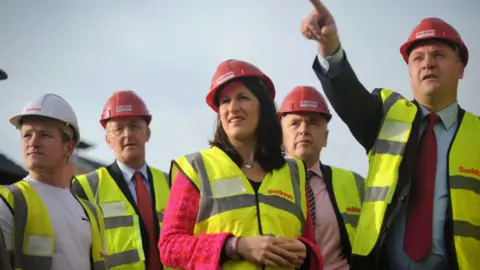 Getty Images
Getty ImagesFollowing Labour’s landslide victory in July’s general election, Reeves was confirmed as the first woman to hold the office of chancellor in its 800-year history.
That was “beyond what a girl like me, from the ordinary background that I came from, could have ever dreamed of,” she recently told BBC Radio 5 Live’s Matt Chorley.
Among a number of early government announcements, she cancelled several infrastructure projects and approved a series of public sector pay rises.
But Reeves will not be delivering her first Budget until the end of October, nearly four months after arriving at the Treasury.
‘Black hole’
Labour argued the time was needed to allow the independent Office for Budget Responsibility (OBR) to properly assess the state of the UK economy. In 2022, Conservative Prime Minister Liz Truss and Chancellor Kwasi Kwarteng had sidestepped OBR scrutiny of their disastrous mini-budget.
But critics said the Budget was the new government’s main lever of change, and that therefore leaving it so long after taking office was a political error.
During the election campaign, Reeves had predicted Labour would inherit the worst economic situation since 1945. In July, she said a spending audit had uncovered a £22bn “black hole” in the public finances left by the previous government.
The Conservatives cried foul and accused Labour of not telling voters the truth about its intention to put up taxes.
During that campaign, independent analysts such as the Institute for Fiscal Studies observed that ruling out increases in income tax, National Insurance and VAT would severely limit Reeves’ room for manoeuvre in the Treasury.
Government sources have told the BBC the chancellor is now looking for tax rises and spending cuts totalling £40bn in the Budget.
One change she announced early was the scrapping of winter fuel payments for millions of pensioners not receiving means-tested benefits. It has proved highly controversial.
Another move unveiled ahead of the Budget was to change the way government debt is measured, to free up billions of pounds of extra investment in infrastructure projects such as roads, railways and hospitals.
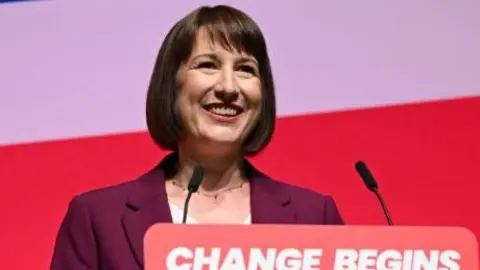 Getty Images
Getty ImagesReeves is determined to remedy the UK’s long-term record of under-investment, setting up a £7bn national wealth fund to encourage private investment in green sectors and repeatedly emphasising the new government’s pro-business credentials.
As she prepares to deliver Labour’s first Budget since 2010, the chancellor has revealed she often chats to a number of senior figures.
“I speak to Gordon [Brown] regularly – I also speak to Tony Blair regularly,” she told Matt Chorley.
Despite their political differences, she also maintains a “good relationship” with Conservative predecessor Jeremy Hunt, she said.
“I may not be particularly impressed with the state of the public finances that he left me, but I do recognise that after Kwasi Kwarteng, he had a tough job to do as well.”
Reeves is politically close to Sir Keir, and also revealed they speak at least once a day, wherever the prime minister is in the world.
But there is a warning from a Labour veteran of the Blair-Brown era, former cabinet minister Lord Blunkett, that she needs to offer the public more hope and less gloom.
He told the BBC Reeves had “been left a terrible hand”, but that “post-Covid, we are a tired nation”, so “more miserableness won’t do”.
He also cautioned that this Budget would probably define the next five years, and that if Labour was going to win a second term, “you have to keep a degree of popularity”. As the Conservatives had found out, he added, “once you’ve lost it, it takes a very very long time to pull it back”.
Politics
Keir Starmer struggles to define ‘working people’ tax pledge

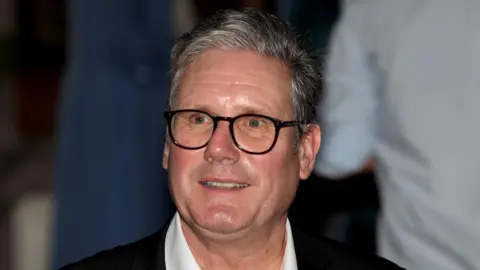 Getty Images
Getty ImagesSir Keir Starmer has attempted to define who “working people” are, amid renewed scrutiny of his tax plans ahead of next week’s Budget.
Labour promised at the general election not to increase taxes on working people – but it is looking to raise some taxes to fund public services.
This could include increases in tax on the sale of assets, such as shares and property, a freeze on income tax thresholds and changes to inheritance tax.
Sir Keir has repeatedly been asked whether “working people” would be hit by these changes.
He insists they won’t but has struggled to offer a clear definition of what counts as a working person in the government’s eyes.
In an interview during a Commonwealth leaders’ summit, the prime minister was asked whether those who work, but get additional income from assets such as shares or property, would count as working people.
He replied that they “wouldn’t come within my definition” – but warned against making “assumptions” about what that meant for tax policy.
He said he thought of a working person as someone who “goes out and earns their living, usually paid in a sort of monthly cheque” and who can’t “write a cheque to get out of difficulties”.
Speaking afterwards, his spokesman sought to clarify that those with a “small amount of savings” could still be defined as working people.
This could include cash savings, or stocks and shares in a tax-free Individual Savings Accounts (ISA), he suggested.
But ministers have been reluctant to translate these comments into numbers.
‘Hypotheticals’
The prime minister accepted that his own definition was “broad”.
Those people he had in mind, he added, were those who were “doing alright” but had an “anxiety in the bottom of their stomach” about making ends meet if something unexpected happened to their family.
The issue has taken on a central political importance ahead of next Wednesday’s Budget, Labour’s first since 2010, amid a row over whether the party is sticking to promises it made in its election manifesto.
During a BBC interview back in the UK, Treasury minister James Murray was asked repeatedly to give a more precise answer.
When asked whether someone who owned shares or sold a business could be a working person, he said he would not “get into too many hypotheticals”.
As well as the broad pledge not to raise taxes for working people, Labour’s manifesto specifically ruled out raising rates of income tax, along with National Insurance and Value Added Tax (VAT).
But ministers have not ruled out continuing to freeze income tax thresholds beyond 2028, a policy they inherited from the Conservatives, dragging more people into higher bands over time as wages rise with inflation.
And they have also not ruled out making employers pay National Insurance on their contributions to workers’ pension pots, which the Conservatives have branded a “tax on work” that will indirectly hit workers.
Labour peer Lord Blunkett, a cabinet minister in the Blair government, said the “logical outcome” of the move was that “employers will pay less”.
He also cautioned that he was unsure of the government’s definition of a working person, adding: “We’ve got to find a different phraseology”.
Other rumoured tax rises include to capital gains tax, which is paid on profits made by selling assets including shares and property other than a main home.
The government is also planning to increase the amount of money it raises in inheritance tax, which is paid after around 4% of deaths.
Multiple changes to the tax, which currently includes several exemptions and reliefs, are under consideration.
Politics
Minister put on spot over ‘working people’ definition
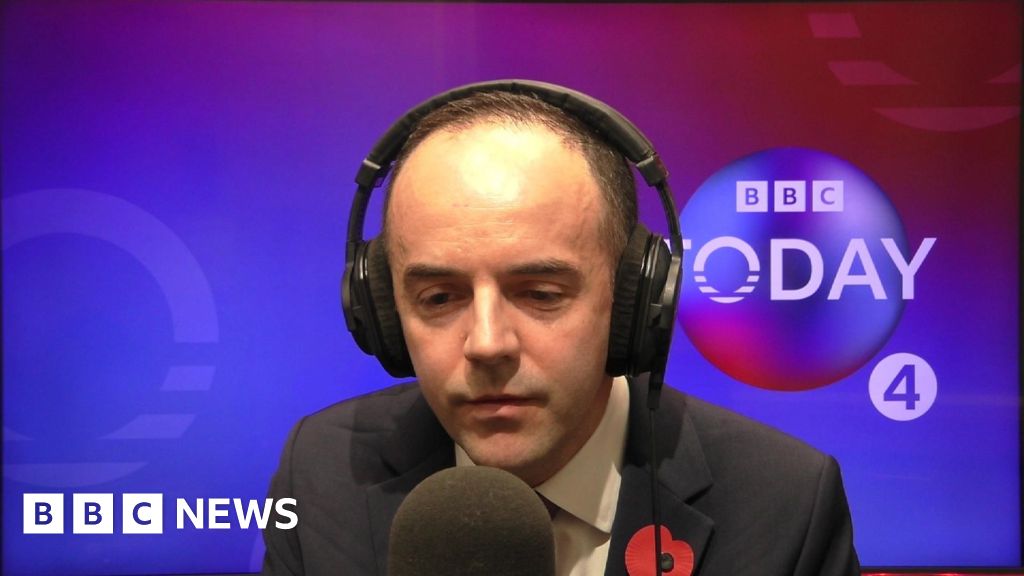
Treasury minister James Murray was asked to define “working people” amid speculation that the chancellor could raise some taxes in the Budget next week.
Murray said the government will keep its manifesto promise to “protect working people”, but he did not answer directly when asked if that group includes landlords, people who own shares or who sell a business.
“Working people are people who go out to work for their income,” he told presenter Nick Robinson on BBC Radio 4’s Today programme on Friday morning.
Asked for a fifth time if he would count landlords among that group, Murray said: “I’m not going to get into too many hypotheticals here, Nick.”
Politics
Starmer confronts slavery reparations and says future should not be ‘in shadow of past’ in Commonwealth address – UK politics live | UK news
Starmer says he understands ‘strength of feeling’ about reparatory justice but future should not be ‘in shadow of past’
Eleni Courea
Eleni Courea reporting from Apia:
Keir Starmer has said he understands the “strength of feeling” in the Commonwealth about reparatory justice but that countries should work together to ensure their future is “not in the shadow of the past, but is illuminated by it”.
Speaking in an executive session of the Commonwealth heads of government meeting (Chogm) hosted in Samoa, the prime minister conceded that the Commonwealth had to “acknowledge our shared history – especially when it’s hard”.
Downing Street has firmly ruled out paying reparations to its former colonies and said it’s not on the agenda for the summit, but Caribbean countries have been pushing for them to be mentioned in the communique.
“I understand the strength of feeling here and that there are some calls to face up to the harms and injustices of the past through reparatory justice,” Starmer told leaders.
“The UK believes the most effective way to maintain a spirit of respect and dignity is by working together to make sure the future is not in the shadow of the past, but is illuminated by it.”
The Guardian reported this week that the UK was open to discussing non-cash forms of reparatory justice such as reforming financial institutions
Starmer had been due to hold a bilateral meeting on Friday with the president of Ghana Nana Akufo-Addo, who has spoken in favour of reparations in the past, but it was called off because of timing constraints.
Key events
Keir Starmer does not think all owners of stocks and shares fall outside his definition of “working people”, Downing Street has signalled, according to the PA news agency.
The prime minister had suggested asset owners would not fall within his conception of what a working person is. The government has been asked repeatedly to define this term, in a bid to establish which taxes may rise in the budget. Labour’s manifesto said the party would not increase taxes on working people, including VAT, national insurance, and income tax.
During a broadcast interview at a Commonwealth summit in Samoa, Starmer told Sky News that he does not consider people who have an income from assets such as shares of property to be working people. “They wouldn’t come within my definition,” he said.
The hint at who falls outside the scope of Starmer’s definition could point to where tax rises might come from in the budget. Among the levies which are reportedly under consideration for a hike are capital gains tax, inheritance tax, and fuel duty, reports the PA news agency.
In a partial climbdown on Starmer’s position, Downing Street later clarified that people who hold a small amount of savings in stocks and shares still count as working people. The prime minister’s official spokesperson said Starmer meant someone who primarily gets their income from assets in his interview.
The PA news agency reports that on Friday morning, a Treasury minister said it is “important to focus on” where people are getting their money from in relation to the debate over the “working people” definition.
James Murray told Sky News that “a working person is someone who goes out to work and who gets their income from work”.
Pushed further on whether a working person could also get income from shares or property, Murray added: We’re talking about where people get their money from, and so working people get their money from going out to work. And it’s that money that we’re talking about in terms of those commitments we made around income tax, around national insurance.
That’s what’s important to focus on, where people are getting their money from, getting their money from going out to work.”
Eleni Courea Eleni Courea reporting from Apia:
Keir Starmer has said he understands the “strength of feeling” in the Commonwealth about reparatory justice but that countries should work together to ensure their future is “not in the shadow of the past, but is illuminated by it”.
Speaking in an executive session of the Commonwealth heads of government meeting (Chogm) hosted in Samoa, the prime minister conceded that the Commonwealth had to “acknowledge our shared history – especially when it’s hard”.
Downing Street has firmly ruled out paying reparations to its former colonies and said it’s not on the agenda for the summit, but Caribbean countries have been pushing for them to be mentioned in the communique. “I understand the strength of feeling here and that there are some calls to face up to the harms and injustices of the past through reparatory justice,” Starmer told leaders.
“The UK believes the most effective way to maintain a spirit of respect and dignity is by working together to make sure the future is not in the shadow of the past, but is illuminated by it.”
The Guardian reported this week that the UK was open to discussing non-cash forms of reparatory justice such as reforming financial institutions
Starmer had been due to hold a bilateral meeting on Friday with the president of Ghana Nana Akufo-Addo, who has spoken in favour of reparations in the past, but it was called off because of timing constraints.
Keir Starmer has confronted calls for the UK to pay reparations for its historical part in the slave trade while surrounded by Commonwealth leaders.
Speaking at an executive session of a Commonwealth summit in Samoa, the prime minister said it was important to acknowledge a “hard” shared history, and that he understood the “strength of feeling” about reparations, reports the PA news agency.
Flanked by leaders from Uganda and Tanzania, Starmer said he wanted to work “together to make sure the future is not in the shadow of the past”, and promised to host a UK-Caribbean forum with leaders of the nations most affected by slavery’s legacy. The prime minister has insisted reparations are not on the table for the Commonwealth summit, even as leaders from Caribbean and African member states have called for discussions on the issue.
The UK has conceded that the issue of reparations could be included in a document due to be signed off at the Commonwealth heads of government meeting this week.
The PA news agency reports that sources accept that there could be a reference to reparatory justice in the communique, but officials stressed that this would not necessarily mean any change in the UK’s policy position.
More on that in a moment, but first, here is an update of the latest developments in UK politics: Keir Starmer does not think all owners of stocks and shares fall outside his definition of “working people”, Downing Street has signalled. The prime minister had suggested asset owners would not fall within his conception of what a working person is. The government has been asked repeatedly to define this term, in a bid to establish which taxes may rise in the budget.
Downing Street is blocking moves to include a ban on smoking outdoors in the upcoming Tobacco and Vapes bill amid fierce opposition by the hospitality trade. No 10 officials privately believe that banning people from lighting up in pub gardens is “an unserious” policy and is not backed by good evidence showing that it harms non-smokers.
A Treasury minister has said he does not accept the idea that changes to the fiscal rules could “punish families with mortgages”, as was suggested by former chancellor Jeremy Hunt. When asked on Times Radio whether he accepted that, James Murray, the exchequer secretary to the Treasury said “well, no.”
Rachel Reeves will pledge to reverse huge cuts in public investment in her budget next week after she confirmed that rules limiting her spending power will be overhauled to enable the government to release as much as £50bn for infrastructure spending.
Businesses that import critical minerals to the UK will be given access to state-backed loans in a move to counter China’s dominance in the market. The chancellor is expected to announce extra government support to encourage the import of critical minerals such as lithium, graphite and cobalt in her budget next week.
The value of the UK’s private healthcare market rose to a record £12.4bn last year as long NHS waiting lists fuelled demand from individuals and the health service paid for nearly £3.5bn of procedures to help ease the care backlog.
A group that emerged out of a faction of the Conservative party has become a forum for Britain’s splintered far right. A private conference hosted earlier this month by the Traditional Britain Group (TBG) was attended by figures from the Homeland party, an extreme nationalist group, as well as rivals from other groups such as Patriotic Alternative.
Starmer says he understands ‘strength of feeling’ about reparatory justice but future should not be ‘in shadow of past’
Starmer confronts slavery reparations calls in address to Commonwealth leaders
-

 Technology4 weeks ago
Technology4 weeks agoIs sharing your smartphone PIN part of a healthy relationship?
-

 Science & Environment1 month ago
Science & Environment1 month agoHow to unsnarl a tangle of threads, according to physics
-

 Science & Environment1 month ago
Science & Environment1 month agoHyperelastic gel is one of the stretchiest materials known to science
-

 Science & Environment1 month ago
Science & Environment1 month ago‘Running of the bulls’ festival crowds move like charged particles
-

 Science & Environment1 month ago
Science & Environment1 month agoMaxwell’s demon charges quantum batteries inside of a quantum computer
-

 Technology1 month ago
Technology1 month agoWould-be reality TV contestants ‘not looking real’
-

 Science & Environment1 month ago
Science & Environment1 month agoX-rays reveal half-billion-year-old insect ancestor
-

 Science & Environment1 month ago
Science & Environment1 month agoSunlight-trapping device can generate temperatures over 1000°C
-

 Science & Environment1 month ago
Science & Environment1 month agoLiquid crystals could improve quantum communication devices
-

 Technology4 weeks ago
Technology4 weeks agoUkraine is using AI to manage the removal of Russian landmines
-

 TV3 weeks ago
TV3 weeks agoসারাদেশে দিনব্যাপী বৃষ্টির পূর্বাভাস; সমুদ্রবন্দরে ৩ নম্বর সংকেত | Weather Today | Jamuna TV
-

 Science & Environment1 month ago
Science & Environment1 month agoQuantum ‘supersolid’ matter stirred using magnets
-

 Science & Environment1 month ago
Science & Environment1 month agoLaser helps turn an electron into a coil of mass and charge
-

 News3 weeks ago
News3 weeks agoMassive blasts in Beirut after renewed Israeli air strikes
-

 Football3 weeks ago
Football3 weeks agoRangers & Celtic ready for first SWPL derby showdown
-

 News3 weeks ago
News3 weeks agoNavigating the News Void: Opportunities for Revitalization
-

 Technology3 weeks ago
Technology3 weeks agoSamsung Passkeys will work with Samsung’s smart home devices
-

 News3 weeks ago
News3 weeks ago▶ Hamas Spent $1B on Tunnels Instead of Investing in a Future for Gaza’s People
-

 Science & Environment1 month ago
Science & Environment1 month agoA new kind of experiment at the Large Hadron Collider could unravel quantum reality
-

 Womens Workouts1 month ago
Womens Workouts1 month ago3 Day Full Body Women’s Dumbbell Only Workout
-

 Business3 weeks ago
Business3 weeks agoWhen to tip and when not to tip
-

 MMA3 weeks ago
MMA3 weeks ago‘Uncrowned queen’ Kayla Harrison tastes blood, wants UFC title run
-

 Sport3 weeks ago
Sport3 weeks agoBoxing: World champion Nick Ball set for Liverpool homecoming against Ronny Rios
-

 Science & Environment1 month ago
Science & Environment1 month agoPhysicists have worked out how to melt any material
-

 Science & Environment1 month ago
Science & Environment1 month agoWhy this is a golden age for life to thrive across the universe
-

 Science & Environment1 month ago
Science & Environment1 month agoQuantum forces used to automatically assemble tiny device
-

 Technology4 weeks ago
Technology4 weeks agoMicrophone made of atom-thick graphene could be used in smartphones
-

 MMA3 weeks ago
MMA3 weeks agoPereira vs. Rountree prediction: Champ chases legend status
-

 News3 weeks ago
News3 weeks ago‘Blacks for Trump’ and Pennsylvania progressives play for undecided voters
-

 Sport3 weeks ago
Sport3 weeks agoMan City ask for Premier League season to be DELAYED as Pep Guardiola escalates fixture pile-up row
-
Business3 weeks ago
DoJ accuses Donald Trump of ‘private criminal effort’ to overturn 2020 election
-

 Sport3 weeks ago
Sport3 weeks agoWales fall to second loss of WXV against Italy
-

 News1 month ago
News1 month ago▶️ Hamas in the West Bank: Rising Support and Deadly Attacks You Might Not Know About
-

 Science & Environment1 month ago
Science & Environment1 month agoITER: Is the world’s biggest fusion experiment dead after new delay to 2035?
-

 Science & Environment1 month ago
Science & Environment1 month agoA slight curve helps rocks make the biggest splash
-

 Technology1 month ago
Technology1 month agoMeta has a major opportunity to win the AI hardware race
-

 Technology4 weeks ago
Technology4 weeks agoRussia is building ground-based kamikaze robots out of old hoverboards
-

 MMA3 weeks ago
MMA3 weeks agoJulianna Peña trashes Raquel Pennington’s behavior as champ
-

 MMA3 weeks ago
MMA3 weeks agoDana White’s Contender Series 74 recap, analysis, winner grades
-

 Sport3 weeks ago
Sport3 weeks agoAaron Ramsdale: Southampton goalkeeper left Arsenal for more game time
-

 Technology3 weeks ago
Technology3 weeks agoMusk faces SEC questions over X takeover
-

 Football3 weeks ago
Football3 weeks agoWhy does Prince William support Aston Villa?
-

 Science & Environment1 month ago
Science & Environment1 month agoNerve fibres in the brain could generate quantum entanglement
-

 Science & Environment1 month ago
Science & Environment1 month agoHow to wrap your mind around the real multiverse
-

 Science & Environment1 month ago
Science & Environment1 month agoNuclear fusion experiment overcomes two key operating hurdles
-

 Science & Environment1 month ago
Science & Environment1 month agoTime travel sci-fi novel is a rip-roaringly good thought experiment
-

 Technology1 month ago
Technology1 month agoWhy Machines Learn: A clever primer makes sense of what makes AI possible
-

 Technology3 weeks ago
Technology3 weeks agoThis AI video generator can melt, crush, blow up, or turn anything into cake
-

 Sport3 weeks ago
Sport3 weeks agoSturm Graz: How Austrians ended Red Bull’s title dominance
-

 News3 weeks ago
News3 weeks agoFamily plans to honor hurricane victim using logs from fallen tree that killed him
-

 Technology3 weeks ago
Technology3 weeks agoGmail gets redesigned summary cards with more data & features
-

 Sport3 weeks ago
Sport3 weeks agoChina Open: Carlos Alcaraz recovers to beat Jannik Sinner in dramatic final
-

 Money3 weeks ago
Money3 weeks agoWetherspoons issues update on closures – see the full list of five still at risk and 26 gone for good
-

 Technology3 weeks ago
Technology3 weeks agoThe best budget robot vacuums for 2024
-

 News1 month ago
News1 month ago▶️ Media Bias: How They Spin Attack on Hezbollah and Ignore the Reality
-
Business3 weeks ago
Sterling slides after Bailey says BoE could be ‘a bit more aggressive’ on rates
-

 Technology3 weeks ago
Technology3 weeks agoMicrosoft just dropped Drasi, and it could change how we handle big data
-

 MMA3 weeks ago
MMA3 weeks agoPereira vs. Rountree preview show live stream
-

 Sport3 weeks ago
Sport3 weeks agoCoco Gauff stages superb comeback to reach China Open final
-

 Entertainment3 weeks ago
Entertainment3 weeks agoNew documentary explores actor Christopher Reeve’s life and legacy
-

 Sport4 weeks ago
Sport4 weeks agoWorld’s sexiest referee Claudia Romani shows off incredible figure in animal print bikini on South Beach
-

 Technology3 weeks ago
Technology3 weeks agoEpic Games CEO Tim Sweeney renews blast at ‘gatekeeper’ platform owners
-
Business3 weeks ago
Bank of England warns of ‘future stress’ from hedge fund bets against US Treasuries
-

 Science & Environment3 weeks ago
Science & Environment3 weeks agoMarkets watch for dangers of further escalation
-

 Business3 weeks ago
Business3 weeks agoChancellor Rachel Reeves says she needs to raise £20bn. How might she do it?
-

 News3 weeks ago
News3 weeks agoWoman who died of cancer ‘was misdiagnosed on phone call with GP’
-

 Technology3 weeks ago
Technology3 weeks agoTexas is suing TikTok for allegedly violating its new child privacy law
-

 Technology3 weeks ago
Technology3 weeks agoOpenAI secured more billions, but there’s still capital left for other startups
-

 MMA3 weeks ago
MMA3 weeks agoKetlen Vieira vs. Kayla Harrison pick, start time, odds: UFC 307
-

 Technology3 weeks ago
Technology3 weeks agoThe best shows on Max (formerly HBO Max) right now
-

 Sport3 weeks ago
Sport3 weeks ago2024 ICC Women’s T20 World Cup: Pakistan beat Sri Lanka
-

 MMA3 weeks ago
MMA3 weeks agoAlex Pereira faces ‘trap game’ vs. Khalil Rountree
-

 Football3 weeks ago
Football3 weeks agoSimo Valakari: New St Johnstone boss says Scotland special in his heart
-

 News3 weeks ago
News3 weeks agoGerman Car Company Declares Bankruptcy – 200 Employees Lose Their Jobs
-

 MMA3 weeks ago
MMA3 weeks agoUFC 307 preview show: Will Alex Pereira’s wild ride continue, or does Khalil Rountree shock the world?
-
Business3 weeks ago
The search for Japan’s ‘lost’ art
-

 Business3 weeks ago
Business3 weeks agoStark difference in UK and Ireland’s budgets
-

 MMA3 weeks ago
MMA3 weeks ago‘I was fighting on automatic pilot’ at UFC 306
-
News1 month ago
the pick of new debut fiction
-

 News1 month ago
News1 month agoOur millionaire neighbour blocks us from using public footpath & screams at us in street.. it’s like living in a WARZONE – WordupNews
-

 Technology3 weeks ago
Technology3 weeks agoJ.B. Hunt and UP.Labs launch venture lab to build logistics startups
-

 News3 weeks ago
News3 weeks agoHull KR 10-8 Warrington Wolves – Robins reach first Super League Grand Final
-
Business3 weeks ago
Head of UK Competition Appeal Tribunal to step down after rebuke for serious misconduct
-

 News3 weeks ago
News3 weeks agoBalancing India and China Is the Challenge for Sri Lanka’s Dissanayake
-

 News3 weeks ago
News3 weeks agoHeavy strikes shake Beirut as Israel expands Lebanon campaign
-

 TV3 weeks ago
TV3 weeks agoLove Island star sparks feud rumours as one Islander is missing from glam girls’ night
-

 TV3 weeks ago
TV3 weeks agoPhillip Schofield accidentally sets his camp on FIRE after using emergency radio to Channel 5 crew
-

 News3 weeks ago
News3 weeks agoHeartbreaking end to search as body of influencer, 27, found after yacht party shipwreck on ‘Devil’s Throat’ coastline
-
Politics3 weeks ago
Rosie Duffield’s savage departure raises difficult questions for Keir Starmer. He’d be foolish to ignore them | Gaby Hinsliff
-

 Technology3 weeks ago
Technology3 weeks agoPopular financial newsletter claims Roblox enables child sexual abuse
-

 Health & fitness3 weeks ago
Health & fitness3 weeks agoNHS surgeon who couldn’t find his scalpel cut patient’s chest open with the penknife he used to slice up his lunch
-

 News3 weeks ago
News3 weeks agoLiverpool secure win over Bologna on a night that shows this format might work
-

 Technology3 weeks ago
Technology3 weeks agoApple iPhone 16 Plus vs Samsung Galaxy S24+
-

 TV3 weeks ago
TV3 weeks agoMaayavi (මායාවී) | Episode 23 | 02nd October 2024 | Sirasa TV
-

 Technology3 weeks ago
Technology3 weeks agoHow to disable Google Assistant on your Pixel Watch 3
-

 Money3 weeks ago
Money3 weeks agoPub selling Britain’s ‘CHEAPEST’ pints for just £2.60 – but you’ll have to follow super-strict rules to get in
-

 Technology3 weeks ago
Technology3 weeks agoIf you’ve ever considered smart glasses, this Amazon deal is for you
-

 Technology3 weeks ago
Technology3 weeks agoAmazon’s Ring just doubled the price of its alarm monitoring service for grandfathered customers
-
Business3 weeks ago
Can liberals be trusted with liberalism?
-

 Technology3 weeks ago
Technology3 weeks agoA very underrated horror movie sequel is streaming on Max


You must be logged in to post a comment Login